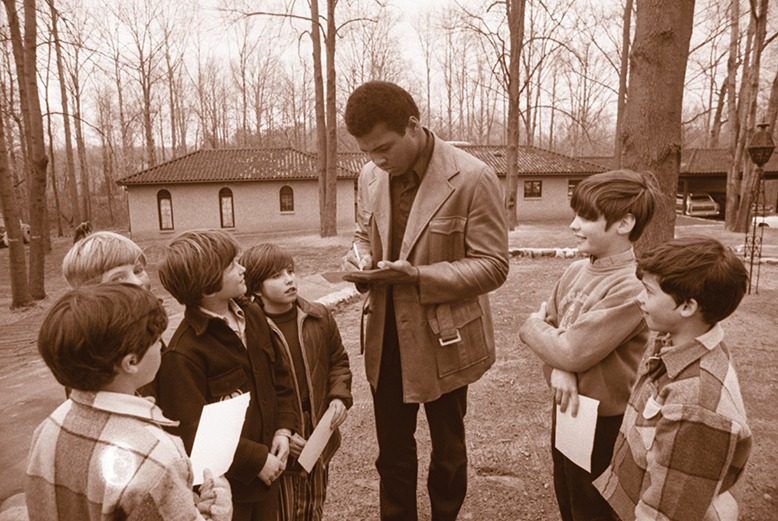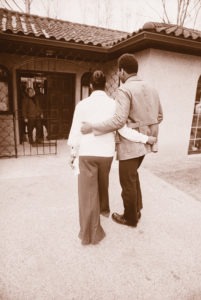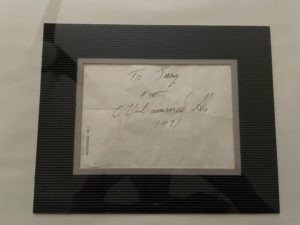
“I am Cherry Hill,” Muhammad Ali proudly proclaimed to the New York Times in 1972. “People write to me from all over the world. They write Muhammad Ali, Cherry Hill, NJ.”
Indeed, Ali—who would have turned 80 years old on January 17, 2022—was Cherry Hill’s most recognizable homeowner at the time. Fifty years later, the legendary boxer, who died in 2016 after a long battle with Parkinson’s disease, remains the most famous person ever to have lived in the South Jersey township.
Although Ali and his family only lived in Cherry Hill from 1971 to 1974, those years were significant ones in the heavyweight champion’s life, coinciding with his resurgence in the ring. His Cherry Hill residency overlapped with his first two fights against Joe Frazier, who famously lived just a half-hour away in Philadelphia. And in June 1971, just a few months after Ali moved to New Jersey, the U.S. Supreme Court supported his religious right to claim conscientious-objector status, overturning his Vietnam War draft-evasion conviction.
On March 18, 1971, 10 days after Frazier beat Ali in the Fight of the Century, a then 29-year-old Ali and his wife at the time, Khalilah Ali, purchased the luxurious, hacienda-style Cherry Hill house for $103,000. He later told Philadelphia Magazine that he put another $150,000 worth of work into the sprawling estate.
“I was proud and happy to be in this comfortable home at a young age,” Khalilah, now 71 and divorced from Ali since 1977, told New Jersey Monthly in a recent phone interview. “It was beautiful—good memories.”

Ali and his then-wife, Khalilah Ali, are seen outside of their Cherry Hill home in 1971. Photo by Bettmann/Getty Images
The 6,000-square-foot, 14-room, terracotta house sits on more than 1.5 acres—and today remains largely unchanged from the outside. Khalilah says there was no landscaping when the couple settled in, and Ali spent around $35,000 for a manicured lawn to set the house off from its wooded surroundings. For privacy, Ali added a Spanish-motif wall and fence to follow the curved street.
The original three-car garage was not adequate for Ali’s fleet of more than a dozen vehicles, including a Lamborghini, a Maserati, a Cadillac limousine, a Blue Bird bus, a Chevrolet station wagon and two Rolls-Royces. Paving was added around the back to increase parking.
The five-bedroom house, which was briefly seen in Ken Burns’s recent documentary “Muhammad Ali,” was built around a courtyard featuring a large fountain that shot water about 20 feet into the air. George Plimpton, author of the book Shadow Box, wrote that Ali handled the interior decorating himself, but Khalilah remembers Ali telling her, “Work your magic.” And she did. The interiors were filled with French Provincial furniture in gold and white, reflecting Khalilah’s taste. The master bedroom had a large, circular bed, and its bathroom featured a sunken Roman tub with gold faucets, befitting “The Greatest.”
However involved Ali was in the decision making, he was proud of the results. “I like pretty things,” he said, according to Plimpton’s book.
The home’s lower level featured an entertainment and projection room, an office, and a lengthy bar with a soda fountain. Ali did not drink alcohol in accordance with his Muslim faith, following his conversion to the religion in 1961. Khalilah emphasizes that the house was “comfortable and had lots of room” for their four young children and two Siberian huskies, Lady and Diablo.
Ali wasn’t involved much in domestic matters, and Khalilah prepared meals for their family and guests. She jokes that her ex-husband “could burn Kool-Aid,” so it was best to keep him away from the kitchen when hosting celebrity visitors like Frank Sinatra, Sammy Davis Jr. or Gladys Knight. “We had so much fun in that house,” Khalilah recalls. “There was never a dull moment”— like the time Ali presented her with a palomino in the living room for her 22nd birthday.
The Alis were the first resident owners of the property, located around the corner from the boxer’s friend Major Benjamin Coxson, a flamboyant figure with shady enterprises in the greater Philadelphia region. Ali, born in Louisville in 1942 as Cassius Marcellus Clay Jr., met Coxson in the late 1960s, and the two developed an intriguing friendship. By June 1970, Ali and Khalilah had moved from Chicago to Philadelphia, near Coxson. Coxson eventually relocated to the upscale Voken Tract section of Cherry Hill. As a confidante, he convinced Ali to settle there as well.
Ali did admit in an early 1972 interview that he wasn’t home much in the Cherry Hill years, yet he maintained a charismatic presence in town. Khalilah remembers the couple would go to a popular local diner for Ali’s favorite chocolate cake. Linda Shapiro Fox, the granddaughter of the owner of a kosher butcher and market on Route 70, remembers once unexpectedly meeting Ali, who was enjoying a meal in the shop’s private kitchen used for preparing take-out food. The market was where the Alis, who followed Muslim dietary laws, got their meats.
William McCargo, a former Cherry Hill police officer who provided private security for the family, says Ali was soft-spoken at home, and that Ali told him, “I have to be loud on TV for promotion.” But Ali lent his star power at appearances and exhibition boxing matches to benefit the Cherry Hill Little League, PTA and Underprivileged Children of Camden. He also attended two local political events to support Coxson in his losing bid for the Camden mayoralty.
As “The People’s Champion,” Ali never turned autograph seekers away. Many area children rode their bikes to the house. Now an adult, Geri White vividly remembers the “talkative” and “gracious” Ali inviting the kids inside to watch TV. They cherish their autographs as souvenirs.

Geri White cherishes this autograph Muhammad Ali gave her when she was a child in Cherry Hill. Photo courtesy of Geri White
Though Khalilah felt increasingly bored and homesick for family back in Chicago, she acknowledged, “things had changed,” too, before their time in Cherry Hill ended. On June 8, 1973, Coxson, Ali’s friend and neighbor, was fatally shot in his house, just a seven-minute walk from the Ali residence; the pre-dawn murder was a rarity in the safe suburban township. News reports claimed, “Whoever killed Coxson wants to kill Ali” and “Ali’s next.” The fighter contended: “I am a Muslim…Allah will take care of me because my hands are clean.” Undoubtedly, the incident frightened him and sealed the decision to leave.
In May 1974, less than four months after his second historic bout with Frazier, Ali and his wife sold their mansion for $175,000.
The couple would split in a bitter divorce just a few years later. Khalilah was Ali’s second wife of, eventually, four.
The home has had only two owners since. Anthony J. Micale, 84, bought the house from Ali—because he was enamored with the structure, more than its previous denizen. “It wasn’t the Ali issue, it was the house,” he insisted in a phone call. For enhanced security, Micale motorized the driveway gates and installed an intercom to ward off curious trespassers.
Micale vividly describes an unexpected visit by Ali, who arrived in a private coach with friends in 1976. Ali returned a decade later. “I really enjoyed the house for 40 years. It was wonderful with family in the house. It is a wonderful piece of real estate,” Micale says.
Nonetheless, in 2014, he sold the property to its current, non-resident owner.
In an email, the property manager mentioned that two years ago, Ali’s oldest child, Maryum, visited and stayed overnight in her old bedroom. Now, inquisitive drivers stop and ask “questions about the great Muhammad Ali.”
From the street, the home’s appearance hasn’t changed much over five decades. Neither has its aura. The property still emanates the glory and mystique of Ali, the global icon whose Cherry Hill residency remains a fascinating aspect of South Jersey history.
Fred B. Adelson is a professor at Rowan University.
